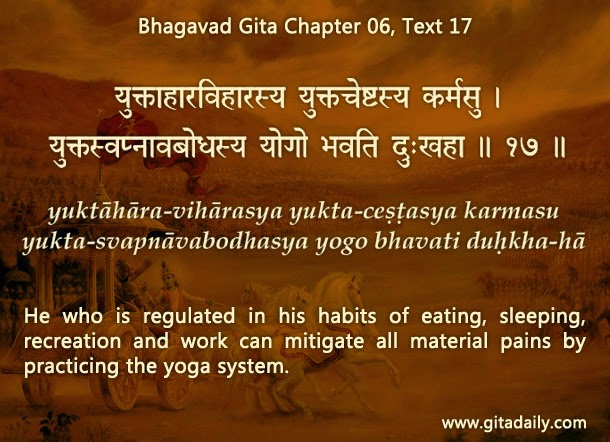Don’t just renounce the material for the spiritual – bring
the spiritual to the material by Chaitanya Charan Das Based on Bhagavad Gita
Chapter 06.
The Bhagavad-gita in its sixth chapter analyzes the process
of ashtanga-yoga. While such yoga is nowadays seen primarily as a tool for
shaping and strengthening the body, the Gita is clear about the world-transcending
thrust of yoga: Serious yogis need to renounce the world and retreat to a
sacred, secluded place for lifelong exclusive dedication to yoga practice.
Yet after describing how yogis renounce the world, the Gita(06.32) declares the topmost yogi to be not those who regard the world with
detachment or disdain, but those who regard it with concern and compassion.
Having realized by their own experience how disconnection from spiritual
reality brings misery and how reconnection with spiritual reality brings
happiness, they want to share their joy with everyone.
Thus, their thrust is not so much on renouncing the material
for the spiritual, but on bringing the joys of the spiritual level of reality
to those who are still at the material level of consciousness. Just as people
in an epidemic zone who have been cured by a potent medicine can commiserate
with the pains of those still afflicted, spiritualists who have been cured of
materialism by the potent process of yoga can commiserate with the pains of those
still trapped in materialistic consciousness.
The Gita declares in its previous verses (06.30-31) that
such compassionate yogis are personalists, for they see the personal
manifestation of the Absolute Truth, Krishna, pervading all of existence.
Understanding that the fully realized vision is not merely of the divorce of
spirit from matter, but of the harmonization of both spirit and matter with
their supreme source, they strive to help everyone progress towards that
harmonization.
Such harmonization can be best achieved by bhakti-yoga,
which efficaciously integrates personal realization and public compassion for
individual and social well-being.

















